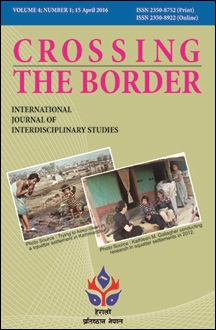Transform Spatial: Making the Case for Spatial Thinking in Higher Education
DOI:
https://doi.org/10.3126/ctbijis.v4i1.18431Keywords:
Spatial abilities, intelligence, dual coding theory, curriculum, GIS, project-based learningAbstract
This white paper argues in favor of an interdisciplinary approach to curriculum design that places greater emphasis on spatial thinking in order to prepare students in higher education for life and careers in the 21st century. While part one of the paper outlines and supports various claims regarding spatial thinking, the second part of the paper proposes an intervention, and introduces the transformed curriculum of a compulsory first-year composition course that emphasizes spatial thinking and experiential learning.
Crossing the Border: International Journal of Interdisciplinary Studies Vol.4(1) 2016: 59-78

